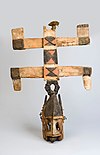In Greek mythology, Aeolus or Aiolos is a name shared by three mythical characters. These three personages are often difficult to tell apart, and even the ancient mythographers appear to have been perplexed about which Aeolus was which. Diodorus Siculus made an attempt to define each of these three, and his opinion is followed here.
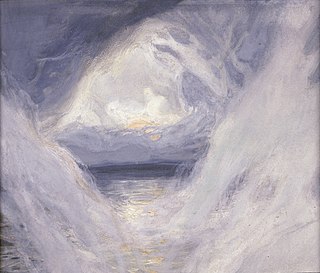
A creation myth or cosmogonic myth is a type of cosmogony, a symbolic narrative of how the world began and how people first came to inhabit it. While in popular usage the term myth often refers to false or fanciful stories, members of cultures often ascribe varying degrees of truth to their creation myths. In the society in which it is told, a creation myth is usually regarded as conveying profound truths – metaphorically, symbolically, historically, or literally. They are commonly, although not always, considered cosmogonical myths – that is, they describe the ordering of the cosmos from a state of chaos or amorphousness.

Babi, also Baba, in ancient Egyptian religion, was the deification of the hamadryas baboon, one of the animals present in ancient Egypt. His name is usually translated as "bull of the baboons", roughly meaning "chief of the baboons".
The Tumbuka are an ethnic group living in Malawi, Zambia, and Tanzania. In Tumbuka mythology, Chiuta is the Supreme Creator and is symbolised in the sky by the rainbow.

Brihaspati, is a Hindu god. In the ancient Vedic scriptures, Brihaspati is associated with fire, and the word also refers to a god who counsels the devas and devis. In some later texts, the word refers to the largest planet of the solar system, Jupiter, and the deity is associated with the planet as a Navagraha.

The Mande languages are a family of languages spoken in several countries in West Africa by the Mandé peoples. They include Maninka (Malinke), Mandinka, Soninke, Bambara, Kpelle, Jula (Dioula), Bozo, Mende, Susu, and Vai. There are around 60 to 75 languages spoken by 30 to 40 million people, chiefly in Burkina Faso, Mali, Senegal, the Gambia, Guinea, Guinea-Bissau, Sierra Leone, Liberia, Ivory Coast and also in southern Mauritania, northern Ghana, northwestern Nigeria and northern Benin.
The Mandé peoples are a linguistic grouping of those African nations who speak Mande languages. They are not a coherent ethnic or cultural group. The various Mandé-speaking nations are concentrated in the western regions of West Africa.

The Soninke (Sarakolleh) people are a West African Mande-speaking ethnic group found in Mali, southern Mauritania, eastern Senegal, The Gambia, and Guinea. They speak the Soninke language, also called the Serakhulle or Azer language, which is one of the Mande languages. Soninke people were the founders of the ancient empire of Ghana or Wagadou c. 200–1240 CE, Subgroups of Soninke include the Jakhanke, Maraka and Wangara. When the Ghana empire was destroyed, the resulting diaspora brought Soninkes to Mali, Mauritania, Senegal, Gambia, Burkina Faso, Côte d'Ivoire, Guinée-Conakry, modern-day Republic of Ghana, Kano in Nigeria, and Guinea-Bissau where some of this trading diaspora was called Wangara, leading to the saying “when Americans landed on the moon, a Soninke was already there” in Senegal, with other versions across West Africa.
The Bafour or Bafur were a group of people inhabiting Mauritania and Western Sahara. Scholars such as H.T. Norris describe "Bafur (Bafour)" as a loose term encompassing the pre-Sanhaja inhabitants of the region, who were "part Berber, part Negro, and part Semite."
The Soninke language, also known as Serakhulle or Azer or Maraka, is a Mande language spoken by the Soninke people of West Africa. The language has an estimated 2.3 million speakers, primarily located in Mali and Mauritania, and also in Senegal, Ivory Coast, The Gambia, Guinea-Bissau, and Guinea. It enjoys the status of a national language in Mauritania, Mali, Senegal and The Gambia.

The beliefs and practices of African people are highly diverse, and include various ethnic religions. Generally, these traditions are oral rather than scriptural and are passed down from one generation to another through narratives, songs, and festivals. They include beliefs in spirits and higher and lower gods, sometimes including a supreme being, as well as the veneration of the dead, use of magic, and traditional African medicine. Most religions can be described as animistic with various polytheistic and pantheistic aspects. The role of humanity is generally seen as one of harmonizing nature with the supernatural.
War-Dyabe or War Jabi, also known as: War Jaabi or War-Dyabe, was the first Muslim king of Takrur in the 1030s, the first to proclaim Islam as a state religion in the Sudan.

There are various ethnic groups in Senegal. According to "CIA World Factbook: Senegal", the ethnic groups are Wolof (39%); Fula (27.5%)); Serer group ; Mandinka (4.9%); Jola (4.2%); Soninke (2.4%); other 5.4%, and other minor ethnic groups like the Bassari, Maures or (Naarkajors)). Many subgroups of those can be further distinguished, based on religion, location and language. According to one 2005 estimate, there are at least twenty distinguishable groups of largely varying size.
The Soninke people are a West African ethnic group that is spread widely over the Sahel region. Their history, as recorded in oral traditions, medieval Arab writings, and modern archaeological and linguistic studies, extends into the first millennium BCE. The Soninke were the founders and rulers of the Ghana Empire, also known as Wagadou, as well as several smaller states such as Gajaaga, Guidimakha, and Kaarta.
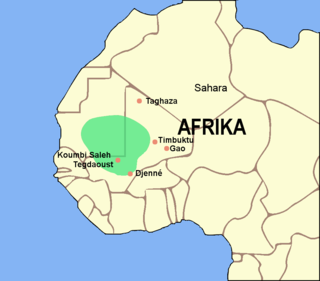
The Ghana Empire, also known as simply Ghana, Ghanata, or Wagadu, was a West African classical to post-classical era western-Sahelian empire based in the modern-day southeast of Mauritania and western Mali.
The Jakhanke -- also spelled Jahanka, Jahanke, Jahanque, Jahonque, Diakkanke, Diakhanga, Diakhango, Dyakanke, Diakhanké, Diakanké, or Diakhankesare -- are a Manding-speaking ethnic group in the Senegambia region, often classified as a subgroup of the larger Soninke. The Jakhanke have historically constituted a specialized caste of professional Muslim clerics (ulema) and educators. They are centered on one larger group in Guinea, with smaller populations in the eastern region of The Gambia, Senegal, and in Mali near the Guinean border. Although generally considered a branch of the Soninke, their language is closer to Western Manding languages such as Mandinka.
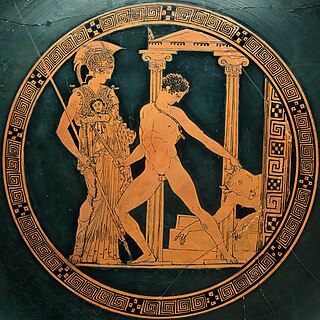
Greek mythology is the body of myths originally told by the ancient Greeks, and a genre of ancient Greek folklore, today absorbed alongside Roman mythology into the broader designation of classical mythology. These stories concern the ancient Greek religion's view of the origin and nature of the world; the lives and activities of deities, heroes, and mythological creatures; and the origins and significance of the ancient Greeks' cult and ritual practices. Modern scholars study the myths to shed light on the religious and political institutions of ancient Greece, and to better understand the nature of mythmaking itself.
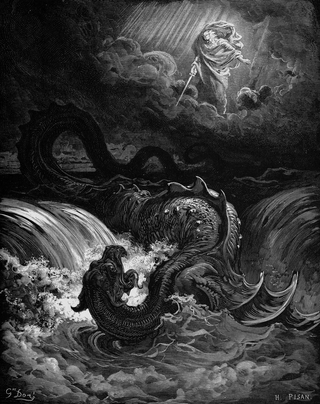
Lotan, also transliterated Lôtān, Litan, or Litānu, is a servant of the sea god Yam defeated by the storm god Hadad-Baʿal in the Ugaritic Baal Cycle. Lotan seems to have been prefigured by the serpent Têmtum represented in Syrian seals of the 18th–16th century BC, and finds a later reflex in the sea monster Leviathan, whose defeat at the hands of Yahweh is alluded to in the biblical Book of Job and in Isaiah 27:1. Lambert (2003) went as far as the claim that Isaiah 27:1 is a direct quote lifted from the Ugaritic text, correctly rendering Ugaritic bṯn "snake" as Hebrew nḥš "snake".

A deity or god is a supernatural being considered to be sacred and worthy of worship due to having authority over some aspect of the universe and/or life. The Oxford Dictionary of English defines deity as a god or goddess, or anything revered as divine. C. Scott Littleton defines a deity as "a being with powers greater than those of ordinary humans, but who interacts with humans, positively or negatively, in ways that carry humans to new levels of consciousness, beyond the grounded preoccupations of ordinary life".
In Greek and Roman mythology, Peristera is a nymph who was transformed into a dove, one of Aphrodite's sacred birds and symbols, explaining the bird's connection to the goddess. This myth survives in the works of Latin grammarian Lactantius Placidus and the first of the three anonymous Vatican Mythographers, whose works were discovered in a single manuscript in 1401.
